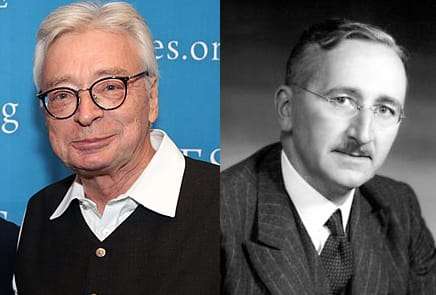Amongst many works of F.A. Hayek in the field of social science, probably the most crucial was the “knowledge problem”.[1] This discovery of Hayek helped him in different fields from Economics to Jurisprudence to Political Philosophy to Philosophy of Science. This insight is very important in mainstream economics too but as Hayek was an Austrian Economist belonging to the disciplines of Menger-Bawerk-Wieser-Mises, but there are scholars from the Austrian School of thought who aren’t fond of it.
Hayek was able to explain that in a society one single person cannot have knowledge of all. Knowledge is needed to take important decisions. What Hayek majorly focused on was the tacit knowledge of time and place and that kind of knowledge can’t be recorded. Other is scientific knowledge that can be recorded and that is something that is only considered by the intellectuals overlooking the other. Scientific knowledge too differs from person to person and cannot be added to make a decision simply in every case. From this, we understand the importance of decentralization but with it, we also get other important messages.
Professor Hans Herman Hoppe is an Austrian Economist.[2] Despite being from the same school of thought he has been a regular critic of Hayek. Hoppe in an interview says
“If socialism’s central problem is the practical impossibility of concentrating decentralized knowledge in the mind of a single central planner, then it is difficult to explain why there are firms and why the owner of a firm does not face exactly the same problem as the central planner under socialism. The owner of a firm also cannot concentrate in his mind all of the decentralized knowledge of the particular circumstances of time and place of all of his employees. Nonetheless, the owner of the firm designs a central plan, and within the guidelines of this overall plan, the firm’s employees then use their own decentralized knowledge to implement and execute this plan. And yet: the owner of a firm does not face the problems of the socialist central planner! This demonstrates that the so-called knowledge problem identified by Hayek cannot be responsible for the known inefficiencies of socialism. Instead: the problem of socialism is precisely the one identified by Mises: the absence, under socialism, of private property in factors of production and hence of money prices for such factors. In contrast: private firms are based on the institution of private property and operate within an environment characterized by the existence of factor prices; hence, unlike a socialist dictator, the owner of a firm can calculate and economize.”[3]
Before going further, it needs to be explained that Hayek was part of the Socialist Calculation Debate which was started by Mises and Mises said that allocation in socialism becomes very difficult because, without prices and money, there can’t be calculation. To this, Market Socialism was invented where there would be prices and money like a market but with a top-down approach of socialism. Here, what was most important rebuttal was Hayek’s Knowledge problem but modern Misesians or more rightly Rothbardians don’t see Hayek’s analysis to be part of the debate.
Sir Hoppe went further saying it to be wrong. Wrong in a sense that even though one cannot have all knowledge but this doesn’t affect calculation. The reason that he puts to support his take is highly naive. Hayek in his paper says that the problem isn’t with planning but “It is a dispute as to whether planning is to be done centrally, by one authority for the whole economic system, or is to be divided among many individuals.” More simply it was an individualist and decentralized approach to planning where each to their own and explain how each is capable to their own.
An owner of a company is planning on his/her own private property. The situation between them and a central planner is very different. The owner is a player in the market system who is getting price signals. Also, it is fundamental in business management to delegate the roles, just like the work is divided, the responsibilities are too but it is the owner who is the risk bearer and therefore he/she benefits the most from it. Similarly, AI also cannot solve this problem, it is an aid to business firms and more fundamental in studies of Business rather than Economics.[4]
Also, there are mathematical calculations done in the business world and they too don’t face any calculation problems. Why? Because they are doing the calculation in the market which is different from that done without a market with no prices and money. The mathematical methods and calculations done in Finance don’t debunk Mises’s Calculation argument and both financial planning and owner’s decision-making wouldn’t be possible in absence of a market. In Business, there are different departments like Management, Marketing, and Finance. Both Management and Finance don’t debunk the concept of Hayek and Mises respectively. Just like how the calculation is done in the market the knowledge is used by the owner within the market system.
Hoppe himself says that unlike central planner the owner of a firm can calculate in existence of factor prices is just like that there can be planning done in existence of prices where prices transfer knowledge and prices give “signals” to economic players.
Professor Israel Kirzner who is also a Mises’s student without distinguishing between his mentor and Hayek has done great work using the importance of tacit knowledge in Entrepreneurship.
It is not at all true that Hayek opposed or didn’t agree with Mises’s Calculation debate (or even concept of Private Property), he even in his paper mentions another type of knowledge problem in the calculation is when in a formula we see a variable “given” but in reality, they aren’t “given”, so in Calculation one will not “know” the value of the goods and services. Hayek’s knowledge problem isn’t just about the fallacy of socialism or calculation but deals with many others issues in field of social science and is able to explain that economics isn’t like Physics where predictions are possible and one is having all the knowledge. Economist Bryan Caplan in his popular essay rightly mentions that the Misesians say the fall of the Soviets was due to the Calculation problem but haven’t proven it[5], there are many other problems in Socialism, the most popular one is the incentive problem. But, probably all these problems whether that of incentive, self-interest, or Calculation can be fitted under the umbrella of the knowledge problem because, in the end, it is the planner knowing less than he should.
Each individual has different expertise and knowledge and therefore a system of decentralized planning is required rather than a collective one. A society can therefore not be run completely by a few individuals even if they are elected on the basis of majority public voting or even if they qualify to be called “intellectuals”. The argument in favor of the knowledge problem isn’t mainly for calculation but is also to advocate the importance of individual capability, the importance of individual liberty, and the rejection of intellectuals’ superiority complex.
[1] https://fee.org/articles/the-use-of-knowledge-in-society/
[2] https://mises.org/profile/hans-hermann-hoppe
[3] https://www.hanshoppe.com/2011/10/social-democratic-hayek-an-interview-with-hans-hermann-hoppe-by-mateusz-machaj/
[4] https://spontaneousorder.in/understanding-the-knowledge-problem/





Nice